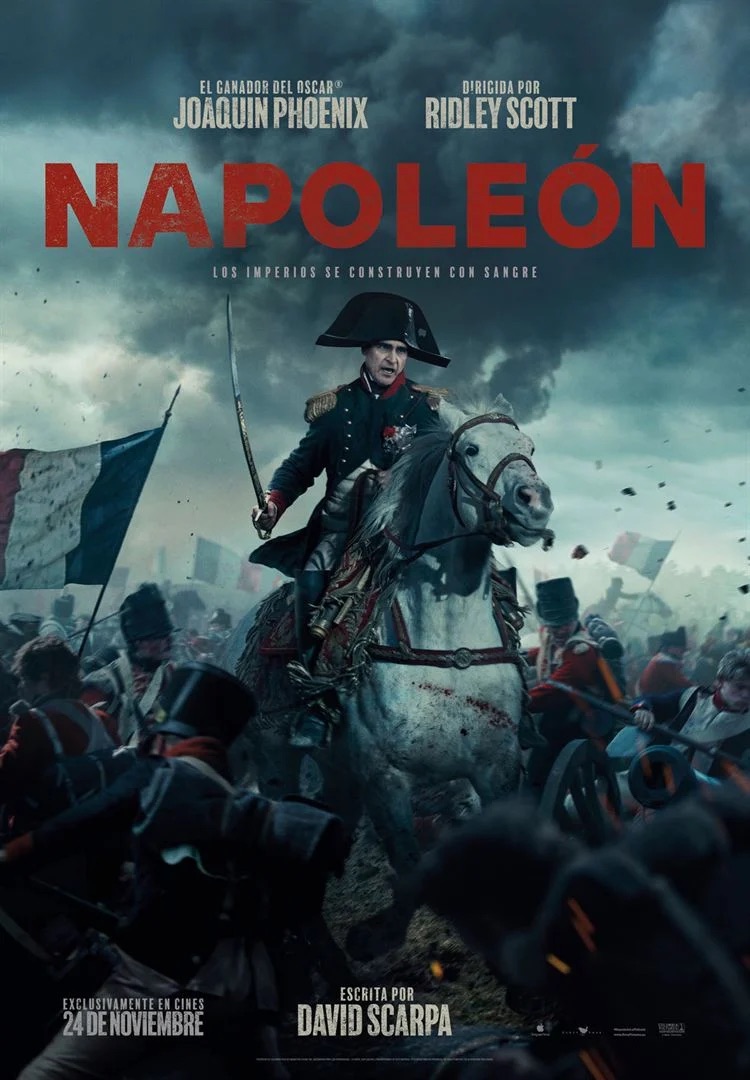
As the cultural press has highlighted these days, it is impossible to make a historical film about Napoleon. To the strong contradictions that arose in his personality and the discrepancies between historians about his figure, we must add—and this is decisive—the fact that myths rise above History. And Napoleon is a nationalist myth, a revolutionary reference for some, a model of the French “grandeur” for others.
The posters for this film, along with that of the director, favor the name of the screenwriter David Scarpa. This underlines the authorship of the person who writes the argument from his specific perspective, making a personal interpretation of the turbulent and contradictory life of the military autocrat. For his part, the moderately attentive viewer has to ask himself what is the point of a film biography of Napoleon in 2023.
The unprejudiced viewer values Ridley Scott’s cinema for its capacity for visual spectacle without prejudice to reflections and inquiries about the human condition, history or the most radical questions. From almost intimate films like Marte (The Martian) (2015) to gender renewals such as Alien, the eighth passenger (1979) passing through singular works such as Thelma & Louise (1991) capable of collecting contemporary trends, Scott has marked an era. Besides, His resume includes films that made him a candidate for a new Napoleon. I am referring to works with a historical setting passed through legend or directly fictions such as Gladiator (2000), the kingdom of heaven (2005) o Exodus: gods and kings (2014).
In this Napoleon The director masterfully handles the staging and provides us with a story that combines the great battles with the most fragile intimacy of the Corsican leader. The brave and reckless Napoleon who conquers the port of Toulon evolves until his decrepitude of Waterloo. Scott enjoys the battles and shows his command of the show, although at times he lacks narrative development. It solves this by giving a unique perspective: thus, one of the great battles of the Napoleonic Wars, Austerlitz, is enhanced by the frozen lake in which the Austrians and Russians can perish. The epic of the battles, with majestic shots of military formations, overwhelming sounds, details of extreme violence and behaviors governed by a sense of honor that transports us to another world, are very powerful in this film. But they are nothing new in Ridley Scott’s films.

The script seeks to investigate the most intimate personality of the emperor and focuses on his relationships with Josephine. It is highlighted how his sincere love for her goes poorly with the desire for offspring and the need for an heir to prolong the dynasty inaugurated by the Corsican soldier. Some of the sequences of this relationship, peppered with moments of humor, are some of the best in the film.
The option to tell practically the entire life of Napoleon leads the story to a certain composition in vignettes, short sequences that condense episodes in need of greater development and dramatic structure. This could be excused if the portrait of Napoleon had more consistency. It must be recognized that the choice of Joaquin Phoenix is very successful, as it gives a guy with a background between unbalanced and perverse that suits the character. The leader’s thirst for power and megalomania, his extravagances and his impermeability to other people’s opinions are well drawn.
However, Ridley Scott does not address the fundamental question that we should ask ourselves today: how was it possible for this visionary to come to power and sow Europe with wars with 3 million dead?, as the final label warns. Any film that deals with the historical past necessarily speaks about the present. Filming a “biography” of Napoleon today makes no sense without seeing in this historical reference and his nationalist drunkenness a precedent for behavior that, to varying degrees, we can identify in Putin, Erdogan, Bashar al-Asad or Netanyahu.

The director omits any explanation or reflection about access to power. For example, when, having been defenestrated in 1814 on the island of Elba, he returns a year later and takes control of the country, the film limits itself to explaining this fact with a harangue to a troop that is defeated. That is to say, the charismatic condition of the leader is highlighted without delving into the change in society that, in such a short period of time, goes from expelling him from power to elevating him.
So things are, This feature film with an undeniable desire for Hollywood spectacle has an uneven result. It thrills at times and astonishes with his skill, fascinates with its exteriors and its photography, but it does not solve the fundamental challenge: to give a vision of Napoleon that is relevant today, when caudillismo and the warlike and expansionist drift of nationalist autocrats grow. .
Napoleon (Ridley Scott, 2023) ⭐️⭐️½
Source: https://www.cineenserio.com/napoleon-desigual-retrato-de-un-mito/


